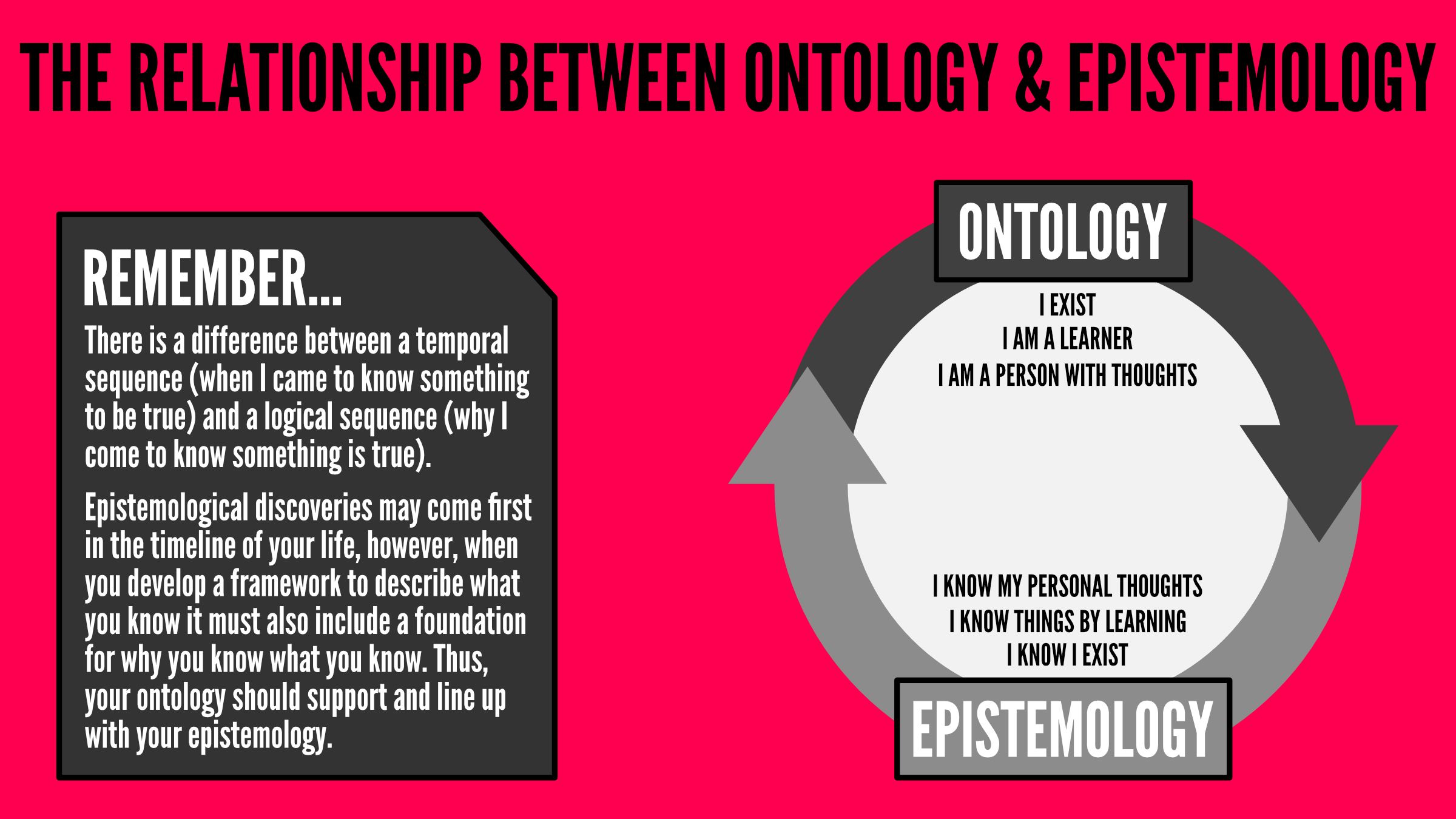It is my goal in this post to briefly explain my apologetic method, rules of debate and main argument for Christianity.
MY APOLOGETIC METHOD
My apologetic method is “Axiomatic Presuppositionalism.” What I mean by axiomatic is that I believe all beliefs and presuppositions are derived from an axiom (a foundation for all other thoughts). I accept the popular definition of an axiom to be, “a statement of knowledge that is taken to be true that serves as a starting point in philosophical and religious discourse.”
My Axiom: The Protestant Bible (sixty-six books) is the Word of God and is the foundation for all truth and knowledge.
What I mean by presuppositional is that I defend the presuppositions of Christianity by stating them clearly from the Bible (God’s revelation- my axiom) and dismantling the presuppositions of all opposing views (2 Corinthians 10:5); and thus showing the opposition’s axiom to be fallacious. I accept the popular definition of a presupposition as, “something assumed beforehand in a discussion.”
My Six Main Presuppositions: God, Creation, Humanity, Jesus, Salvation & Judgment.
- GOD: God is one all-powerful, all-knowing, ever-present and all-loving being revealed in three divine persons which are separate, but equal- the Father, the Son and the Holy Spirit (i.e., “The Trinity”). (Matthew 28:19)
- CREATION: God created the heavens (galaxies and solar systems, etc.), along with earth around 6,000 years ago. (Genesis 1)
- HUMANITY: God created humanity, both male and female, in His image to be fruitful and multiply and have dominion over the earth. However, mankind chose sin and thus has suffered the penalty of physical death and evil upon the earth (both natural calamity and moral violations). (Genesis 3 & Roman 3)
- JESUS: God the Son came in the flesh to be the substitutionary sacrifice for humanity’s sins and only by faith in Jesus can someone be born again and saved from eternal damnation. (John 3)
- SALVATION: After Jesus’ death, burial and resurrection He ascended to heaven and sent the Holy Spirit (along with the Father) to regenerate and empower all believers to be disciples that make disciples. (Acts 1)
- JUDGMENT: Jesus is coming back to judge the living and the dead; all those who are been saved will receive a resurrected body and forever be with Him upon the earth in the Kingdom of God and those who have not be born again will be sentenced to the lake of fire with the devil and his angels. (Revelation 20)
MY RULES FOR DEBATE
I’ve noticed in philosophical and religious debates most people do not have the same rules. Two debaters who don’t agree upon the same rules are like two people playing two different sports in a game. For example, if one debater thinks he or she is playing soccer (a sport in which you cannot use your hands to score) they’ll keep kicking the ball to score, whereas, if the other debater believes the game is basketball they’ll keep using their hands to shoot the ball and score points. Hence, the feeling most people have when watching people debate- confusion and too much talking past each other.
My Three Ground Rules for Debate: Three Laws of Logic, Certainty & Honesty.
- THREE LAWS OF LOGIC: I affirm the Three Universal Laws of Logic. I also affirm that I don’t have to agree with or know all possible philosophies or religions (1 Corinthians 1:18-25 & Colossians 2:8). If someone wishes to use other philosophical or religious foundations to make their points that is fine- hence the debate- however, to win the argument they must clearly and unambiguously do so within the three laws stated here. In other words, debate is not like a ballet contest where someone’s form is judged by others, it is like a UFC match where the best idea standing wins. Therefore, I affirm;
- The Law of Identity: Whatever is, is. A=A. (Genesis 1:1, All identities come from God, “In the beginning God…”)
- The Law of Non-Contradiction: Nothing can be and not be. A cannot be different from B and be the same as B at the same time. (Genesis 1:4, God distinguishes and separates between what is and what it not, like He did with light and darkness, “God separated the light from the darkness…”)
- The Law of the Excluded Middle: Everything must either be or not be. A is either a true proposition or it isn’t- it has to be either true or false. (John 1:1, because Jesus himself is Logic, nothing can be both true and false, all things reduce down to either being true or not true, “In the beginning was the Word/Logos…”)
- How to Determine the Winner: Therefore, the winner of the debate must not have any of their presuppositions in violation of these laws. For example, if my presuppositions cannot be proven false with these three laws they will stand true and if the opposition’s presuppositions are shown to be in violation of these laws they have lost the argument.
- Note: All other laws of logic that come as a result of modus ponens and other logical formulations must be simplified into the above three laws.
- CERTAINTY: I affirm that my axiom and six main presuppositions can be known with certainty. I define certainty as, “the belief that something is reliably true.” If the opposition denies that certainty is possible in any circumstance or that certainty is not possible in the discussion of God or Christianity they have conceded the debate and thus I am not obligated to entertain the “fool according to their folly” (Proverbs 26:4). For example, if an atheist opponent states, “I cannot be certain that God does or does not exist,” they lose the debate on the grounds they violated the law of non-contradiction because they are certain about their uncertainty. That is why people on both sides of the debate must present a positive case for their belief. I will never only defend Christianity, in so doing, I will also attack and destroy the opposing view. There is never a neutral debater- everyone is standing for something and their axiom and presuppositions must be exposed.
- HONESTY: I affirm that all people in the discussion must be honest in their dealings with the subject debated. If at anytime it is discovered that someone is lying or intentionally withholding the truth, the debate is over because God said in 2 Timothy 2:16 via Paul, “Avoid godless chatter, because those who indulge in it will become more and more ungodly.” I refuse to reason with fools who deny truth with their actions.
THE ARGUMENT FROM CERTAINTY
The argument from certainty for Christianity (as stated above with the Bible as my axiom and my six presuppositions) is as follows:
In Statement Form: We can be certain about nothing in life unless Christianity is true. (or) We can only be certain about things in life because Christianity is true.
In Syllogistic Form:
Premise 1: If Christianity is not true, nothing in life can be known with certainty.
Premise 2: Certain things in life can be known with certainty (existence, laws of logic, God, Christianity, God’s Word, etc.).
Conclusion: Therefore, Christianity is true.
(Note: I affirm many other arguments for God’s existence (“The Moral Argument,” “The First Cause Argument,” etc.) and the validity of Christianity (“The Minimal Facts Argument,” “The Resurrection of Jesus Argument,” etc.) however, I believe the argument from certainty bests summarizes my angle in defending the faith.)
UNDERSTANDING LEVELS OF KNOWLEDGE
I believe that there are different levels of certainty with each different level of knowledge; and I affirm that not everything we hold as knowledge can be certain, thus it should be considered opinion.
Please note the following knowledge categories in regards to their level of certainty:
- AXIOM: A statement of knowledge that is taken to be true that serves as a starting point in philosophical and religious discourse. Should be held with the highest level of certainty and only changed if one’s entire foundation is flawed (Matthew 7:24).
- PRESUPPOSITIONS: Knowledge assumed beforehand in a discussion. Should be held as certain as the axiom or close to it but willing to adjust if needed. This is the heart of most debates (2 Timothy 3:16-17).
- PROPOSITIONS: Various beliefs or theories that are based in logic, math and divine revelation. Held with certainty but open to modifications. Used as evidence to demonstrate the axiom and presuppositions (Hebrews 11:1 & Luke 1:4). In other words, “facts.”
- OPINIONS: Various beliefs derived from induction via the scientific method and sense experience. Not certain but should be held true only if it is high in probability (more likely to be true than not). In other words, “a best guess.”
THE UNION OF EPISTEMOLOGY & ONTOLOGY
I believe that it is impossible to separate one’s epistemology (how one gains knowledge) from one’s ontology (what knowledge is). Without first establishing one’s view of existence (ontology), one cannot properly gain knowledge (epistemology).
For example, if someone doesn’t first describe their ability to exist as a knower, nothing they say they know can be considered valid because it could still be possible they don’t exist. Thus, the one engaging in debate over any knowledge claim must have a explanation for knowledge existing and themselves as a knower (ontology). From a proper explanation of ontology they can describe how they gain knowledge (epistemology).
(Note: This does not mean that learning about or understanding ontology must come first in one’s life experience, but it must be described first in a logical sequence when discussing why a person can gain any knowledge. For example, I had to understand how to read and communicate before I could read the Bible, however, the explanation to why I am a reader comes logically before I learned to read because it explains why I could learn to read.
This is best explained by saying there is a difference between a “logical sequence of events” and a “temporal (in time) sequence of events.”)
ANSWERS TO OBJECTIONS TO THE ARGUMENT FROM CERTAINTY
Objections from Atheism and Agnostic Beliefs:
- Nothing is Certain: To make this statement you have to be “certain” that “nothing is certain,” thus you have violated the law of non-contradiction.
- Just Claiming that You are Certain Doesn’t Make it True: Are you certain about that? If so, you have just contradicted yourself.
- Based on Your Definition I Have Certainty Too: Then demonstrate your certainty from the presuppositions that come from your axiom without violating the three main laws of logic. If you don’t ground your presuppositions in an axiom like God you will not be able to overcome an infinite regress. An infinite regress is a violation of the law of non-contradiction (something cannot be and not be at the same time).
Objections from Other Religions:
- My Book and Religion Gives Me Certainty: Therefore, based on the law of identity we must identify the identity of our Creator and the validity of our revelation(s). As per the law of non-contradiction and the excluded middle, we both cannot be right. So let us examine our presuppositions and see which one stands true in the end.
- Nothing is Certain in Religion, Only the Belief in God is Certain: To make this statement you have to be “certain” that “nothing is certain” thus you have voilated the law of non-contradiction. Also, my God, the one true God, gives me certainty in the core teachings of our faith and He cannot lie; thus once again we cannot hold to opposing views about God and both be right.
THE THREE CATEGORIES FOR MOST AXIOMS
- SKEPTICISM: We cannot have knowledge of any propositions.
- EMPIRICISM: Sense experience is the ultimate source of all our concepts and knowledge (“a posteriori”).
- RATIONALISM: Knowledge is gained independently of sense experience in an innate way (“a priori”). (My, “Axiomatic Presuppositionalism” could also be known as, “Revelational Rationalism”).
CONCLUSION
It was my aim to give a simple framework for me proceeding forward in debate and discussion with those who oppose Christianity. If you’re a Christian like me who loves apologetics, I pray this post was helpful for you to develop your own personal apologetic method, rules and arguments!
1 Peter 3:15, “But in your hearts revere Christ as Lord. Always be prepared to give an answer to everyone who asks you to give the reason for the hope that you have. But do this with gentleness and respect.”







